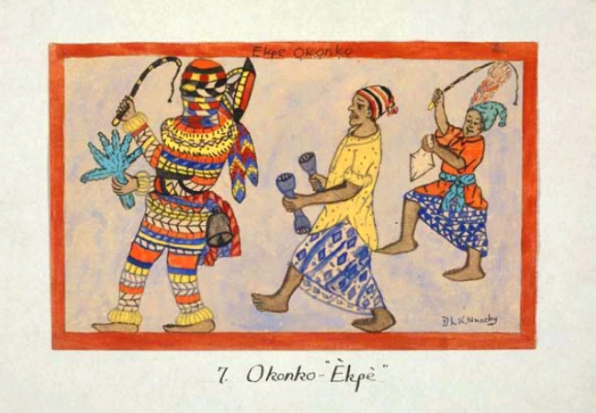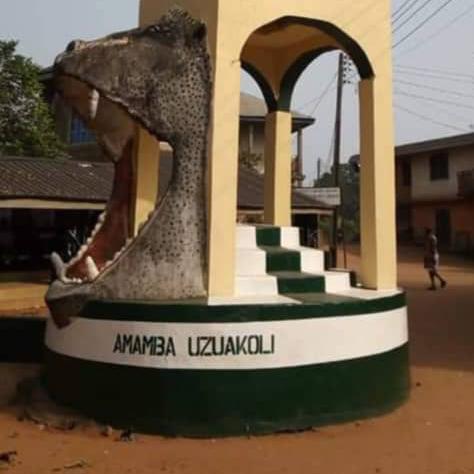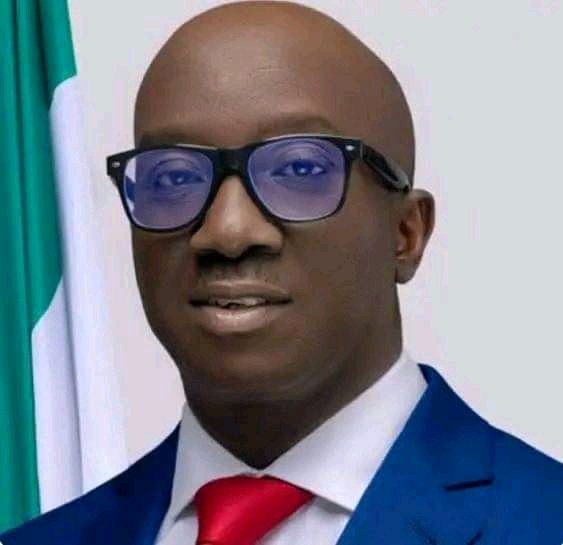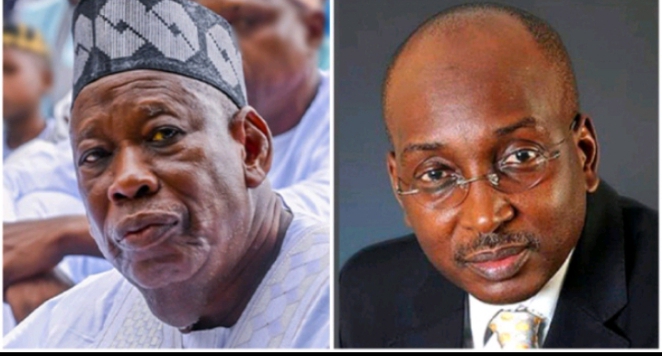
The great Ákàá okonko?
Great Uzuakoli annual Okonko fraternity carnival begins in grand style!

It’s been a beehive of cultural carnival in Uzuakoli Ancient Kingdom, Bende local government area of Abia State, Nigeria.
The biannual okonko fraternity carnival is one of the cultural heritage of the popular town, which is home to other tourist attractions like the cool/hot natural stream, Amamba leopard towers, the famous Methodist college Uzuakoli and the vintage leprosy centre Uzuakoli among other landmarks.
Uzuakoli, once a slave trading post, was among the early recipients of Christianity in Igboland, hosting the famous Methodist Boys College. Ravished by Christianity and westernization, the traditional heroes are almost forgotten. These surviving rituals, songs, and nsibidi dances and signals are what make the Uzuakoli version of the traditional Igbo Okonko fraternity unique – attracting foreign and local spectators every two years.
These were among the Igbo people Olaudah Equiano, in the 18th Century, celebrated as “a nation of dancers, musicians, and poets. Thus every great event, such as a triumphant return from battle, or other cause of public rejoicing is celebrated with public dances, which are accompanied with songs and music suited to the occasion.
A scion of one of the founders of Uzuakoli, his forebears were reputed to be in the slave business, along with some Aro merchants. Vanguard Arts was shown the slave routes around the town, which passes through the Methodist College to Ozuitem, down to far away warriors’ land of Abam and Arochukwu, reputedly, the slave headquarters of Africa then. It told of the sacred areas of Uzuakoli, its historical and revered places, its personalities , history of origin, honour and rich cultural heritage.
Introduction
Festival is an occasion for celebrating especially a day or time of
religious or cultural significance that recurs at regular intervals. It is a
time people do something they normally do not; they abstain from
something they normally do; they carry to the extreme behaviours that are
usually regulated by measure; they invert patterns of daily social life.
Reversal, intensification, trespassing and abstinence are the four cardinal
points of festival behaviour. There are many festivals in Nigeria, some
of which date to the period before the arrival of the major religions in this
ethnically and culturally diverse society (museum collections 2013). The
main Muslim and Christian festivals are often celebrated in ways that are
unique to Nigeria or to the people of a particular society [2]. The
Nigerian Tourism Development Corporation has been working with the
state to upgrade the traditional Nigeria festival, which may become
important sources of tourism revenue [3]. Among the Igbos of Nigeria,
there is a wealth of cultural heritage manifested in ceremonies and
festivals. Social phenomenon like marriage, birth, farming, harvest,
victory and many other social institutions are celebrated. These cultural
activities contain the germs of rich poetry and prose, excellent music and
lively drama which have not been raised far above their traditional level
although present day scholars – Sociologist, Anthropologist and Literary
researchers are showing sufficient interest. Some of these works will
be examined in relation to definition, function and structure. Ezeala noted
that festivals are very popular and recurrent events in traditional African
life. He summed it up by defining festivals as: Any special occasion,
observance or celebration which may be religious or secular in nature and
which is generally marked by merry-making, performance of music and
the like. Festivals, according to Nwocha can in most cases be said
to be a good measure of the intensity of the religious consciousness and
cultural richness of a people. He further stated that feasts are the external
manifestation of religion itself in every culture and they very often
include sacrifice as a prominent part of their ritual.
From these definitions, it is clear that festival is a celebration, a feast, a
season of musical or other performance which involves joyfulness and
merry making. The masquerade on the other hand plays a very significant
role in the history and culture of communities in Nigeria. Though back
ground origin of masquerade may differ, their overall role like traditional
dances can be classified into categories. For instance, there are
masquerades whose major role may be pure entertainment, ceremonial,
rituals or a combination of some or all of these.

Masquerades are much more than mere entertainment. It is a vehicle for
religious activities, social and political control.
Ezeala stated that the Igbo masking societies serve many other
functions. According to him, they help to stabilize Igbo society and
culture by presenting hereditary rights, regulating conducts and
entertaining the people. It is also a training ground for both youths and
adults. Above all, it provides a bond of union that transcends kinship not
only within the community but also between it and others in which mask
exists. He summed it up by noting that Igbo masks perform major socio-
political functions in times of stress whim apparently all else has failed. Nwocha stated that masquerades in Igbo culture serve various
purposes in different occasions such as Christmas and Easter
celebrations. They also serve useful purposes during burial ceremonies
and religious functions. According to him, it is the most used
entertainment media whenever a member dies. Similarly Nwocha
noted that the masquerade performs an incredibly large number of
functions and plays a vast number of roles in the life and thought of our
communities. Ezeala and Nwocha supported the above idea by
stating that masquerades are used as agents of social control and as
symbol of authority.
On the other hand festival period in general are times of peace. It is a
time when quarrels and other differences are settled. The period of
festivals as emphasized are periods when all conflicts and
disputes must be abandoned for the sake of ceremonial co-operation.
Ezeala noted that festivals encourage friendship which is expressed in
communal eating and drinking. It is a time for exchange of gifts and
settlement of dispute. Festivals give people the opportunity to
establish extended relationship which bears with it the reciprocal bonds
of social interaction. According to Ezeala the rituals involved in
festivals helps to rejuvenate the society as a whole. It provides occasions
for peace-making, renewal of friendships and covenant relationships, get-
together and merry-making. He further stated that rituals, celebrations
and festivals occupy a position of signal importance in the traditional
African societies. Based on the fore going, the documentary seeks to
examine the social, political, economical and religious significance of
Ekpe confraternity in Uzuakoli Ancient Kingdom of Abia State. The study
will equally examine the effect of modernization on these festivals. It is
also worthy to note the Ekpe which is discussed in this paper has nothing
in connection with the famous Ekpe cult of Akwa Ibom and Cross Rivers
States of Nigeria. Amankulo made this clear distinction by stating that
„Ekpe‟ (tone marked low low) should not be confused with Ekpe (tone
marked high low) the later is a secrete cult which is exclusive to men.
The Ekpe cult is equally popular among the Efik and Anang of Nigeria.
But Ekpe enjoys communal patronage and participation on which women
and children form part of the choric force. He also stated that the Ekpe
festival, an action packed festival full of songs and dances is one of such
cultural event needs a deeper investigation of which would reveal its
great significance such as religious rituals, potentials, dance and
drama.
Objectives of the documentary
The following are the specific objectives of the documentary
1. To identify the social significate of Ekpe and Ikoro festival
2. To examine the political significance of Ekpe and Ikoro festival
3. To examine the economic significance of Ekpe and Ikoro festivals
4. To identify the religious significance of Ekpe and Ikoro
5. To examine the extent to which Ekpe and Ikoro festival had been
affected by agents of change.
6. To suggest possible ways of improvifng the status and relevance of
Ekpe and Ikoro festivals in Uzuakoli.
Significance of the Study
Theoretically this study will provide current reference to the study of
festivals. This is because in recent times scholars have not written much on festivals. It will also be relevant in the area of ethnography and
cultural anthropology.



